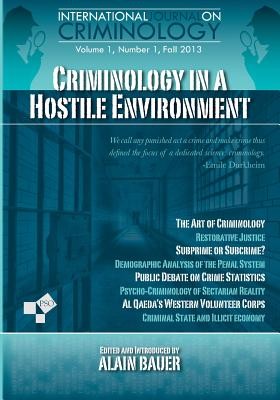
- We will send in 10–14 business days.
- Publisher: Westphalia Press
- Year: 2013
- Pages: 132
- ISBN-10: 1935907387
- ISBN-13: 9781935907381
- Format: 17.8 x 25.4 x 0.7 cm, minkšti viršeliai
- Language: English
- SAVE -10% with code: EXTRA
Criminology in A Hostile Environment (e-book) (used book) | bookbook.eu
Reviews
Description
Is using the humanities and social sciences (psychology, sociology, law, etc.) to understand the crime, the criminal, the victim, criminality, and society's reaction to crime a science? A crime is the unique combination of a perpetrator, a victim, and a set of circumstances. Its individual and quantitative analysis requires scientific methods and specific intellectual and technical abilities. Emile Durkheim emphasizes that "[...] A number of acts can be observed, all with the external characteristic that once accomplished, they provoke this particular reaction from society known as punishment. We make of them a group sui generis, on which we impose a common rubric. We call any punished act a crime and make crime thus defined the focus of a dedicated science: criminology". About the editor: Alain Bauer is Professor, Chair of Criminology, National Conservatory of Arts and Crafts, Paris, Senior Fellow at the Terrorist Center of John Jay College of Criminal Justice in New York (USA), Senior Fellow at the Law and Political Science University of China in Beijing (PRC), President of the National Private Security Control Council (CNAPS) (since 2012), President of the Strategic Research High Council to the President of France (since 2009), sometime Vice President of the Sorbonne University, Consultant for the New York Police Department (USA), the Los Angeles Sheriff Department (USA), the Sûreté du Québec (Canada), Colonel of the Air Force (Reserve), Republic of France. His books include Violences et insécurité urbaines (PUF 1998, 12ème éd. 2010), - L'Amérique, la violence, le crime (PUF 2000, 2ème éd. 2001), - La guerre ne fait que commencer (Jean-Claude Lattès 2002, Folio Gallimard 2003), - Les polices en France (PUF 2001, 3ème éd. 2010), - Le crime aux Ãtats-Unis (PUF 2003), - Les polices aux Ãtats-Unis (PUF 2003), - Dico Rebelle (Michalon 2004), - Imaginer la sécurité globale (La pensée et les hommes Bruxelles 2004), - Ãtat d'urgence (Robert Laffont 2004), - L'énigme Al Qaida (Jean Claude Lattès 2005), - Géographie criminelle de la France (Odile Jabob 2006, Histoire criminelle de la France.
- Publisher: Westphalia Press
- Year: 2013
- Pages: 132
- ISBN-10: 1935907387
- ISBN-13: 9781935907381
- Format: 17.8 x 25.4 x 0.7 cm, minkšti viršeliai
- Language: English English
Is using the humanities and social sciences (psychology, sociology, law, etc.) to understand the crime, the criminal, the victim, criminality, and society's reaction to crime a science? A crime is the unique combination of a perpetrator, a victim, and a set of circumstances. Its individual and quantitative analysis requires scientific methods and specific intellectual and technical abilities. Emile Durkheim emphasizes that "[...] A number of acts can be observed, all with the external characteristic that once accomplished, they provoke this particular reaction from society known as punishment. We make of them a group sui generis, on which we impose a common rubric. We call any punished act a crime and make crime thus defined the focus of a dedicated science: criminology". About the editor: Alain Bauer is Professor, Chair of Criminology, National Conservatory of Arts and Crafts, Paris, Senior Fellow at the Terrorist Center of John Jay College of Criminal Justice in New York (USA), Senior Fellow at the Law and Political Science University of China in Beijing (PRC), President of the National Private Security Control Council (CNAPS) (since 2012), President of the Strategic Research High Council to the President of France (since 2009), sometime Vice President of the Sorbonne University, Consultant for the New York Police Department (USA), the Los Angeles Sheriff Department (USA), the Sûreté du Québec (Canada), Colonel of the Air Force (Reserve), Republic of France. His books include Violences et insécurité urbaines (PUF 1998, 12ème éd. 2010), - L'Amérique, la violence, le crime (PUF 2000, 2ème éd. 2001), - La guerre ne fait que commencer (Jean-Claude Lattès 2002, Folio Gallimard 2003), - Les polices en France (PUF 2001, 3ème éd. 2010), - Le crime aux Ãtats-Unis (PUF 2003), - Les polices aux Ãtats-Unis (PUF 2003), - Dico Rebelle (Michalon 2004), - Imaginer la sécurité globale (La pensée et les hommes Bruxelles 2004), - Ãtat d'urgence (Robert Laffont 2004), - L'énigme Al Qaida (Jean Claude Lattès 2005), - Géographie criminelle de la France (Odile Jabob 2006, Histoire criminelle de la France.


Reviews